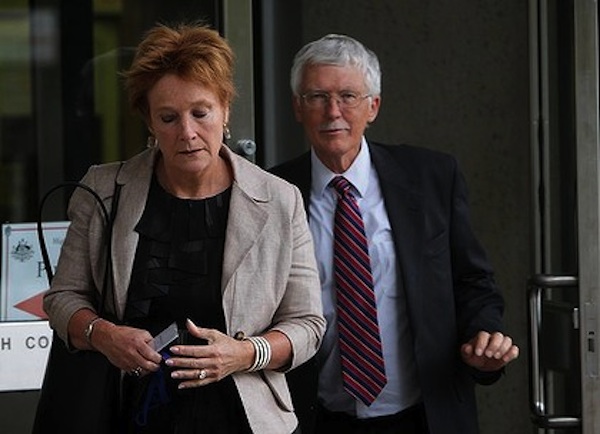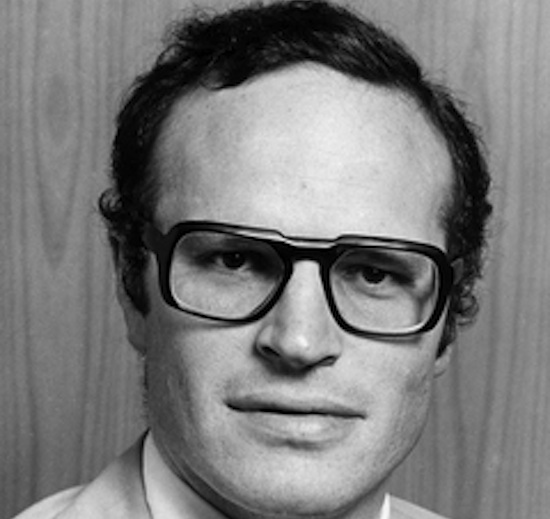The Rule of Law Institute had been rooting for upholding the NSW Court of Appeal's decision in the James Hardie directors' case ... Fortunately, the High Court had better ideas about the rule of law ... Strange connections ... Dyse Heydon's comprehensive skewering
 Hellicar: the tragic face of James Hardie
Hellicar: the tragic face of James Hardie
NAGGING thoughts persist about the James Hardie case and the High Court's thoughts on the duties of hapless directors who get themselves caught in the sticky web of executives, spinners and lawyers.
The chief spinner, of course, was Greg Baxter, who glided onto greatness, until recently, as one of Rupert's spokesmuffins and enforcers. The lawyers were white-shoe boys at Allens.
It was Dyse Heydon who most gingerly deflated the grand concoction of the NSW appeals court (Spigs, Margaret Beazley and Thin Roger Giles) that ASIC had failed some magically sprung "duty of fairness" because it didn't call David Robb, one of the lawyers on the company drip.
The outcome from the CA was that ASIC failed to prove directors were responsible for saying the asbestos compensation trust was "fully-funded", when it was $1.5 billion underfunded.
Among a raft of curiosities was the role of the ubiquitious log-roller and ex-Labor senator Stephen Loosely, who attached himself to the James Hardie teat and helped propagate the "fully-funded" myth to the NSW government.
Tom Bathurst QC, as he then was, acted for four of the defendant directors, instructed by Antagonistic Heartless: Michael Brown, Michael Gillfillan, Meredith Hellicar and Martin Koffel.
In the CA the next CJ managed to persuade the old CJ to swallow a great pile of hogwash.
He was about to try and do the same to the High Court when during the special leave process he got the call to higher things, leaving Justin Gleeson to step in and cop the barbs from Heydon J.
Ken Hayne had this to say about Bathurst's sudden departure:
"Ladies and gentlemen, but for the withdrawal of Mr Bathurst due to a subsequent engagement, I will take the appearances to be as they were."
It was a nice line - the "duty of fairness", and its breach by the failure to call Robb, which meant that ASIC's case had to be consigned to the dustbin, rather than have a new trial.
The High Court saw past the magnificent plumage of the Sydney bar and found that the Emperor was in his grimy undies.
Puzzling, though, is the strange connection that Spiggsy Spigelman had, and still has, with an outfit called the Rule of Law Institute, which is run out of the back office of tax firm Speed & Stracey.
Spigs, even when he sat on the Hardie directors' appeal, was patron of the Rule of Law Institute and had attended corroborees organised by this outfit.
The RoLI has been steadfastly indignant about government regulatory agencies, including ASIC, and their powers. You can explore its tireless list of submissions, papers, presentations and conferences here.
Its main mission is as a propaganda machine to bolster the importance of lawyers and judges as central to civilisation and a bulwark against governments and their agencies that might get in the road of the upward thrusting pistons of capitalism.
There's more about its mission statement here, replete with typos - Richard McHigh "QC", who is on the governing committee and whose "pro-bone" assistance is appreciated by president Robin Speed.
The RoLI had a thing or two to say about ASIC and the James Hardie case, particularly while the High Court appeal was underway.
Executive director Richard Gilbert huffed to the Financial Review that in its special leave application ASIC did not mention the word "fairness:
"ASIC refuses to answer the basic issue that it failed to do the right thing by consciously deciding not to call an important material witness in the James Hardie case."
The RoLI said it would press the AG to tighten the model litigant rules so that ASIC wouldn't be allowed to play "hardball" with cruelly put-upon captains of industry.
All of this strikes a cosy note with its patron, who ultimately found against ASIC with reasoning that, as one CA judge confided, was "precious beyond belief".
It looks messy when the Rule of Law Institute gets rolled by the rule of law judges.
More recently, the institute has been funding professorships and talkfests at schools, teachers' associations, and legal studies workshops - all pressing the importance of lawyers and their rule.
Former Federal Court judge Kevin Lindgren is now the adjunct professor of The Rule of Law at the University of Sydney, if you please.
The CA outcome also produced other unfortunate outbursts, including John Antagonistic's demand for an apology:
''Given the harmful effect of the proceedings on the lives of the former Hardie non-executive director defendants ... Messrs Lucy and D'Aloisio [from ASIC] and perhaps in part even former federal treasurer Costello, who presumably had a hand in funding ASIC's case, owe apologies.''
These days Meredith Hellicar mentors business leaders.
* * *
 Dyse The Younger
Dyse The Younger
DYSE Heydon stole all our favourite parts of the High Court's reasons:
"The Solicitor General of the Commonwealth, who presented ASIC's oral argument in chief, described a key part of the Court of Appeal's reasoning as 'an interesting agglomeration of rather disparate thoughts'.
A little more politely, it might be said that the Court of Appeal's reasoning is long, detailed and complex."
In the toss-up between admiring or admonishing it's not hard to guess what call Heydon would have made. He went on:
"It is controversial whether any of the respondents asked the Court of Appeal to recognise a 'duty of fairness' with all the consequences the Court of Appeal attributed to it.
Certainly not all of them did. In this court, the written submissions of the Solicitor General of the Commonwealth subjected the 'duty of fairness' to very damaging criticism.
The respondents, perhaps detecting a depressing odour of morbidity and impending failure in the largely unsolicited bounty that the Court of Appeal conferred on them, contended that the two strands of the Court of Appeal's reasons were distinct and independent.
The respondents' written submissions either did not support recourse to the duty of fairness or downplayed it."
As to the "crucial" witness that ASIC didn't call at the trial, Heydon was specially devastating:
"Mr Robb had supervised the drafting of the minutes before the meeting. He had participated in the settling of the minutes after the meeting. He had charged for these activities. If he had admitted participation in the preparation of a false minute, he would have risked admitting that he had aided and abetted criminal offences under ss.251A and 1308 of the Corporations Act: see Criminal Code (Cth), s.11.2.
Cross-examiners setting for themselves the goal of eliciting admissions from Mr Robb that a most important part of the minutes was an elaborate lie and that he had aided and abetted the commission of crimes would have been possessed of the most boundless and heroic optimism.
Not only would that outcome be inconsistent with the minutes and the surrounding circumstances, it would be contrary to Mr Robb's own interests in every way. It is, in fact, inherently very unlikely."
Amen.
* * *
Useful links ...
High Court: ASIC v Hellicar
High Court: Shafron v ASIC
NSW Court of Appeal's James Hardie decision
Justice Gzell's trial decision